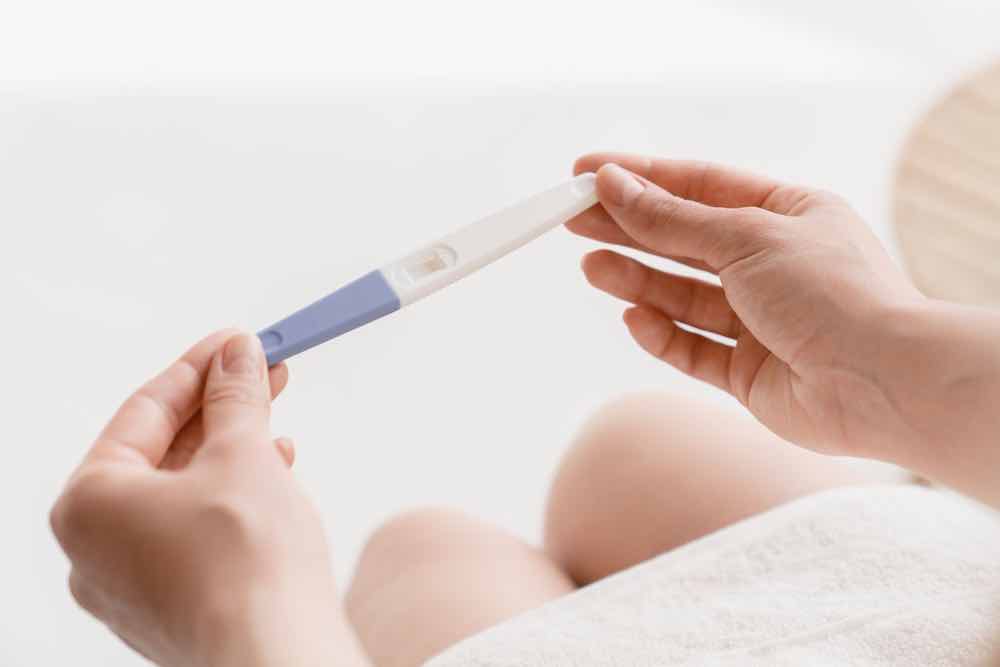Are you stressing out about whether or not you could be pregnant? Worried about getting a false result on those home pregnancy tests? I get it — and confusion is the last thing you want when you’re just trying to get some answers. You’re totally valid for feeling that way. It’s normal to have questions like, “how common are false negative pregnancy tests?”
I’ll explain how these tests work — and what could make them give you a false positive or negative. That way, you’ll feel more prepared for your pregnancy test. Uncertainty really adds anxiety (that you don’t need right now!). Just know, you’re slaying it. You’ve got this. You have what it takes.
But let’s talk a little about how these little tests actually work.
How do pregnancy tests work?
Pregnancy tests detect a hormone that only is present in the body during pregnancy. It’s called human chorionic gonadotropin (hCG, or the pregnancy hormone) — and your body starts producing hCG once an embryo implants in the uterus. Usually, this hormone starts showing up in your urine 12-15 days after ovulation1 (or around the time you would normally expect your period. That’s why most tests tell you to wait until you’ve missed your period before testing. The thing is, hCG levels double about every 48 to 72 hours in early pregnancy. So if you test too early, there might not be enough hCG for the test to pick up, even if you are pregnant.2
If you’ve missed your period, you’re welcome to come and take a no-cost pregnancy test at ThriVe. Our tests are lab-quality and extremely accurate. You won’t have to worry about getting a false result. And we’ll never judge you, no matter what your circumstances are.
So, how common are false negative pregnancy test?

False Negatives: More Common Than You Think
Let’s start with false negatives since that’s what most people are worried about. A false negative happens when the test says you’re not pregnant, but you actually are. According to the Mayo Clinic, incorrect negatives are more common than incorrect positives.1 Especially if you test too early. So how do you make sure you aren’t getting an inaccurate answer?
Here’s what could mess with your test result:
– Testing Too Early: If you take a pregnancy test before your hCG levels are high enough to detect pregnancy, you could get an incorrect result. Even if you’re super regular with your periods, ovulation can vary. Implantation (and hCG production) might be later than you expect. It’s best to wait until at least the first day of your missed period (or even a few days after that) in order to get an accurate pregnancy test result.2
– Diluted Urine: Been drinking loads of water? Your urine might actually be too diluted for many home pregnancy tests to pick up the hCG. That’s why most instructions say to test first thing in the morning. That’s when your urine is most concentrated.2
– Not Following The Directions: If you don’t follow the instructions exactly—like not peeing on the stick long enough, or not waiting the right amount of time to read the result — it could mess up the test. Also, shaking the test or holding it in a weird way after peeing on it could cause the result to be off. Try to let the test sit for the full amount of time it says.2
– Expired Tests: Check the expiration date! Using an expired test can give you inaccurate results because the chemicals in the test might not work as well after the expiration date.2
So we’ve talked about how common are false negative pregnancy test, but what about false positives?
False Positives: Rare, But Possible
An incorrect positive result is when the test says you’re pregnant, but you’re actually not. They’re much less common than incorrect negatives. But it’s not out of the question. Some common reasons are:
– Chemical Pregnancy: Sometimes, an egg is fertilized and hCG is produced, but the embryo doesn’t implant properly or the pregnancy ends very early. Your hCG levels might still be high enough for a positive test, even though the pregnancy has already ended naturally.2 If you’re wondering about this happening to you, please come see us. We can perform an ultrasound to see what’s going on with your body. And (as always at ThriVe), this service is also no-cost.
Should you re-test?
So, if you DO get a negative test — but still don’t get your period, don’t freak out just yet. How common are false negative pregnancy test? It happens, so just take your time. The Mayo Clinic suggests retesting in a few days or a week.2 If you get another negative and still no period, or if you’re feeling all the early pregnancy symptoms (like nausea, sore breasts, fatigue), it’s time to call your doctor or head to ThriVe. We’ll be able to get you some answers. Our no-cost pregnancy tests and ultrasounds can help you get to the bottom of what’s going on. Plus, we’ll be able to support you with information.
Now, if you get a negative test and you’re not sure it’s accurate, retesting in a couple of days is a good idea. Why? Because hCG levels should rise quickly. And if you’re still unsure or the results are mixed, don’t hesitate to get an ultrasound for confirmation. We’ve got your back at ThriVe.

Need some support?
I know all this info can be overwhelming. The good news is that you don’t have to figure it all out on your own. ThriVe offers no-cost, lab-quality pregnancy tests, so you can know for sure you have an accurate result. We’ve got your back with clear answers so you can feel confident in what’s going on. Plus, if you are pregnant, we can help you with information as you figure out your next steps. No strings attached. We’ll never pressure you into anything. We want to empower you in your choice and your future.
The Bottom Line
Ladies, it’s totally normal to be nervous about this. But home pregnancy tests are usually reliable if you follow the instructions and time it right. If you’re ever in doubt, ThriVe is here to help. No judgment, just solid answers and support. You got this, and you don’t have to do it alone.
Let us know if you want to talk more or if you’re ready to set up an appointment. We’re here for you.
Sources:






